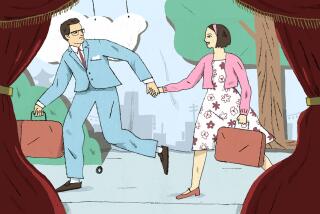So, you thought you were marrying just one person?
WHEN you make a lifelong commitment to another person, you bind yourself not only to your beloved but to your belovedâs family as well. It doesnât matter if your in-laws are living or dead, reside in your house, are two states away or are on the other side of the planet, their presence will be felt. The princely way his mother treated him as a child will set up expectations on how he is to be pampered by his spouse. The attention she received (or failed to receive) from her father will shape her relations with her partner. And then thereâs the whole logistical nightmare of blending families, traditions, expectations -- not to mention the gantlet weâve just run: the holidays.
For ages, in-laws have been the butt of jokes, the source of anguish at couples counseling sessions and, in some happy cases, the wellspring of much joy and peace. In âI Married My Mother-in-Law,â an anthology of true tales by 17 writers, the jokes are blessedly few, the stereotypes all but nonexistent, and the poignancy, affection and strain that can accompany family expansions are penned with insight and grace. As Sarah Jenkins, the one pseudonymous writer in the collection, puts it, a good set of in-laws âwould never jump-start a dead marriage, [but] a bad set would be one of the first things on your tear-stained list of Why I Should Go.â
The strongest offerings mine the complexity of human relations, going for neither a simply warmhearted response nor a vindictive, angry tirade. Peter Richmond, in his title essay, discovers an unexpected welcome and a blossoming friendship with his silver-haired, patrician and well-read mother-in-law. Martha McPhee longs for tangible in-laws, having married a man whose parents have died: â âYouâre just like your father,â Mark has said after a fight in which Iâm particularly impatient. âThatâs not fair,â I always respond. I donât know which parent of his to blame his faults on.â
In Michael Chabonâs poignant piece, âMy Father-in-law, Briefly,â he reflects on the much-loved father-in-law he lost when Chabonâs marriage to the manâs daughter disintegrated. (Also featured in the collection is an essay by his current wife, Ayelet Waldman, as well as a pair of pieces by married contributors Kathryn Harrison and Colin Harrison.) Susan Straightâs skillful âA Family You Canât Divorceâ explores the decades-long multiracial communion the author continues to share with her in-laws long after her marriage ended: âLast year, while publicly excoriating a white woman my brother-in-law dated, my former sister-in-law started in on her hair. I said gently, âNow give her a break. Iâm blond, too, remember?â The three women with us looked at me blankly, then sucked their teeth and said, âNo, youâre not,â before going on about the conversation.â
There are occasional rants. Amy Bloomâs âDead, Thank Godâ pulls no punches, telling readers in numbing detail of the incensed loathing she feels for her now-deceased in-laws. The angriest of the essays, it feels one-dimensional and lacks texture.
Exploring the good, the bad and the ugly when it comes to in-laws, the essays run more to the bittersweet than the bitter. This may reflect a trend toward improved relations in general, though I doubt it. Editor Ilena Silverman notes that she had a hard time getting writers to contribute. Many she approached told her theyâd love to read such a book but couldnât themselves write about their in-laws. âTheir relationship with them was fraught enough; who wanted to ratchet things up by taking it public?â Silverman was able to cajole authors into committing their tales to the page, but one wonders what details may have been left out for the writers to escape with family relations intact.
As a whole, though, the book gives a glimpse of the many flawed and intricate ways we strive to make peace with those whom our loved ones love while also trying to wrest our own relationships free from the shadows of the past.
But mostly, the work reflects how we learn about ourselves and the ones we love by navigating the thorny, dubious waters of in-law-hood, and live (one hopes) to tell the tale.
Bernadette Murphy, a regular contributor to Book Review, is the author of âZen and the Art of Knitting.â
More to Read
Sign up for our Book Club newsletter
Get the latest news, events and more from the Los Angeles Times Book Club, and help us get L.A. reading and talking.
You may occasionally receive promotional content from the Los Angeles Times.








